These Models Spoke Out About Their Sexual Assaults and Say They Were Blacklisted
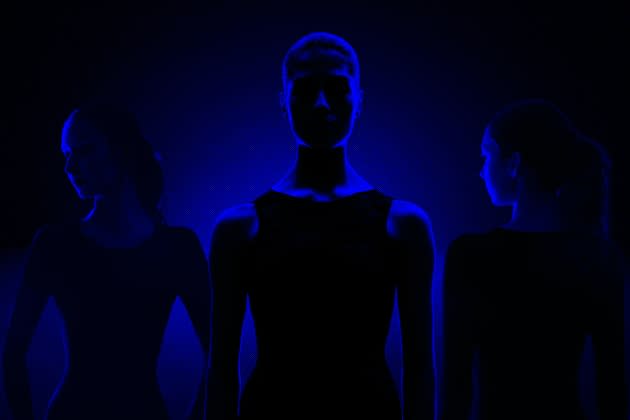
A 17-year-old California runaway was discovered by one of the most powerful modeling agencies in the world and told her dreams of global fame and fortune were an ocean away in Paris, where a high-level agent would let her live with him and support her burgeoning modeling career. And so, Carré Sutton (also known as Carré Otis), young and with barely a penny to her name, left the U.S. to live with Gérald Marie, then head of Elite Model Management’s European division. Shortly after arriving in Paris, Sutton was told she needed to meet with the “boss.” Marie, who was married to supermodel Linda Evangelista at the time, greeted the teen with a swift slap on her butt and told her, “On my dime, I don’t want your opinion, Carré. I want your obedience.”
One day, following a long photoshoot, Sutton returned to Marie’s apartment. She showered and went to bed. Sutton claims an intoxicated Marie entered her bedroom — and raped her.
More from Rolling Stone
Hollywood's Welcomed Jeremy Piven Back But His Accusers Haven't Forgotten
Justin Timberlake Reveals Clean Cut Look for New Louis Vuitton Campaign
Courtroom Spectacle: Gwyneth Paltrow's Glasses Go Viral During Ski Crash Trial
Sutton, now 54, tells Rolling Stone that she is reluctant to revisit the details of her alleged sexual abuse as it triggers her post-traumatic stress, referencing her legal filing against Marie.
According to the complaint, Sutton grew “distant from Marie but remained obedient to him as she needed Marie to survive in Paris,” and that Marie “expected [Sutton] to let him rape her which he did repeatedly over the span of months” whenever “Evangelista left the apartment.”
After enduring months of what Sutton claims was serial sexual abuse, she turned 18 and began refusing Marie repeatedly.
“Marie got angry and said that no one says no to him,” the complaint reads. “He asked her if she knew the implications of saying no to him and she said yes. She was kicked out of his apartment shortly thereafter and was transferred to Milan.”
“There are repercussions for speaking out. I look back at my career, and it’s so sad, but I was a child who said, ‘No, don’t rape me anymore.’ I didn’t work. I was taken out of the game,” Sutton says.
Sutton filed a lawsuit in New York in 2021 against Marie, alleging she was repeatedly sexually abused at 17 years old by the powerful fashion executive, and sexually trafficked to other men by Marie. She is one of fifteen women who’ve gone to the French authorities and reported that they were allegedly sexually assaulted by Marie, according to CBS News.
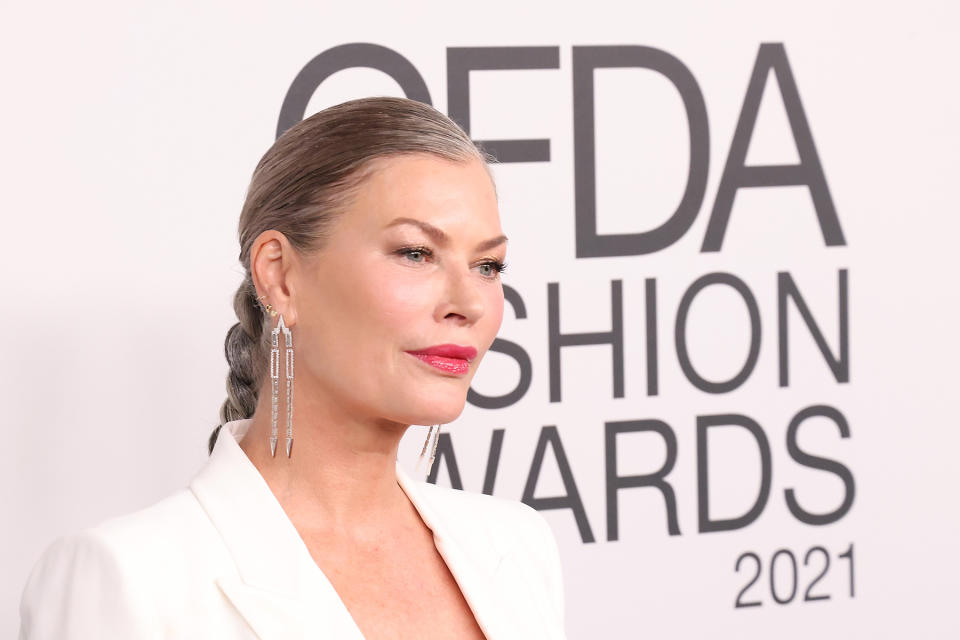
While in her teens, the supermodel claims she fought back against Marie’s alleged abuse, and her career suffered as a direct consequence of her refusals. Sutton tells Rolling Stone “it’s a reality” that if models speak out against alleged sexual misconduct they could face being blacklisted from the fashion industry.
Even though we are more than five years into the #MeToo era, several models who spoke out against alleged sexual misconduct from high-profile power players say that the fashion industry has failed accusers. In response to coming forward, they claim they’ve been retaliated against, silenced, and blacklisted.
“My being blacklisted, it is an ongoing thing,” Sutton maintains. “I think there’s different sorts of phases and stages of it and the repercussions for me over the past decade is that I really haven’t had any real work except Hourglass Cosmetics hired me because of my voice and activism, but it’s been few and far between.”
Sutton, a former Calvin Klein campaign model, maintains that after speaking out against Marie’s alleged abuse she was kicked out of her Paris apartment and forced to live in squalor. Her castings were taken away. An American teenager in Europe, she says she felt trapped, unsupported, exploited, lost, and financially unable to support herself. Her alleged abuser essentially controlled Sutton’s very ability to survive. She says the psychological ramifications of her alleged sexual abuse, along with the lack of support within the industry, attributed to her being anorexic during that period of her life. Years later, she was diagnosed with post-traumatic stress disorder as a result of her torturous experiences in the world of modeling.
“The repercussions of people in power let me know what would happen when I spoke out, and this continued to this day,” Sutton says. “I’ve been blacklisted for a long time because of my voice within the industry, but that started when I was seventeen.”
Sutton claims her career-sidelining happened through the actions of others that held influence within the industry.
“There were very few allies within the industry. The way things are set up, especially in Europe with agencies and bookers, is you’ve got this very powerful person running the show, and then you’ve got the bookers that are not necessarily working to protect the young girls. I’m sure there were a couple of bookers that really looked out for models. You go to Marie P. Anderson, she was the head of Elite Chicago, she started to speak out and she was a protector, but there were ramifications for her.”
Anderson, who worked as an agent for Elite Chicago from 1983-1990 and now runs her own model coaching firm, Boss Babe Models, says her decision to speak up over the mistreatment of models was and is still not received well by industry insiders.
“Over the years, I’ve been ostracized by the industry in general. People have literally gone out of their way to prevent me from being hired by agencies in various American cities — citing that I’m ‘crazy,’ ‘overly-dramatic,’ etc. When I’ve been at networking events, various agents have asked me to ‘shut up’ about the darker side of the industry.”
Anderson says that models wrestling with coming forward with claims of misconduct should know the possible ramifications.
“There is a great deal of unprofessionalism in the industry — verbal abuse, physical abuse, sexual abuse, questionable finances, etc., and there are very few accountability consequences for the abusers,” she explains. “There is very little built-in support for trauma survivors.”
After the Vogue cover girl was removed from Marie’s Parisian flat, Sutton claims the jobs stopped.
“There weren’t even castings I was sent out on, so it was really obvious what was going on. I didn’t have success in my career until much later, like years later,” she attests.
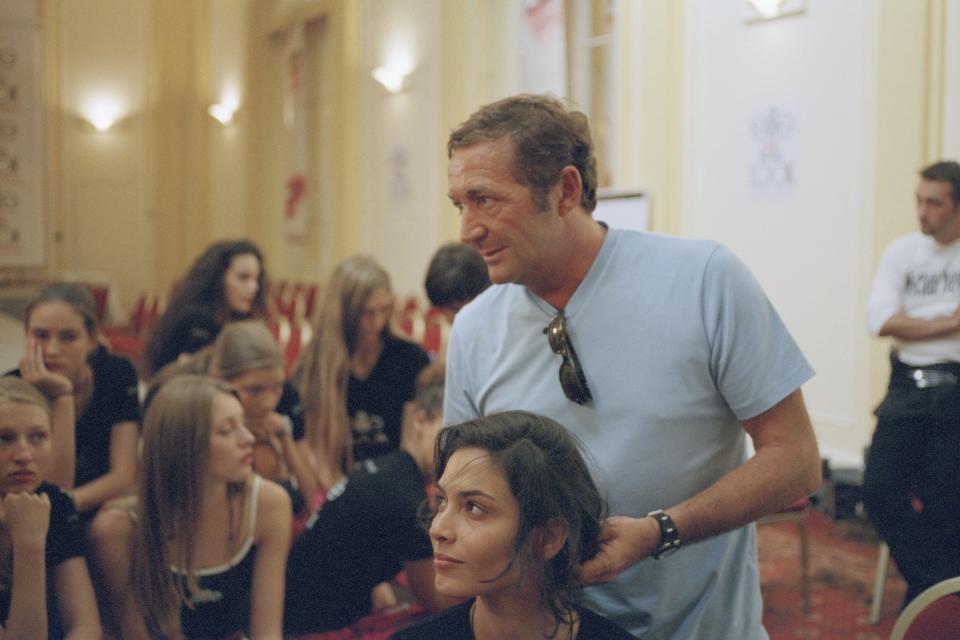
She continues, “It took me decades working with a trauma therapist to even name what I experienced and not normalize it. I was so groomed and conditioned by my experiences that even after I had made it it was common to be on a photoshoot with really big photographers and have them say to me, ‘I want you to think I’m fucking you up the ass. That’s the look I want for the shot.’ Even then, in my late twenties and thirties, I didn’t feel I could say a thing.”
French prosecutors closed an investigation into sexual assault claims against Marie dating back to the 1980s and 1990s on Feb. 13, citing that they failed to meet the statute of limitations.
Marie’s attorney, Celine Bekerman tells Rolling Stone, “The case against Gerald Marie has been dismissed. Justice has finally triumphed despite the infamous media campaign that Gérald Marie has been subjected to for two years. With this decision, it is now clear that Gérald Marie is and will remain innocent. It is now time for appeasement.”
Meanwhile, Sutton’s lawyer, John Clune, says the decision to close the criminal case was not a surprise to him.
“The decision not to prosecute Marie was expected given the problems with France’s statute of limitations. We hope France takes a hard look at their laws so that similar cases can proceed in the future. This decision won’t have any impact on the outcome of Carré’s civil case.”
Sutton’s attorney John Clune reveals that the civil case against Marie is at a standstill as they await a decision on their appeal.
“Carré’s case is on appeal to the Second Circuit Court of Appeals. The lower court ruled that her case was not revived by the NY Child Victims Act and thus untimely and we are appealing that decision,” Clune says. “Marie has similarly avoided charges due to the statute of limitations. It seems that unless a survivor comes forward who was abused more recently, he is likely never to be charged despite the large number of women reporting being abused.”
Oral arguments in the appeal case are set for May 10 in New York.
Marie’s counsel, Celine Bekerman, denied Sutton’s claims telling Rolling Stone: “My client firmly objects to the defamatory and false allegations made against him. For two years he has been subjected to unprecedented media harassment, even though the accusations against him are unfounded and not supported by any evidence.”
The survivor advocate and mother of two daughters says that any perception that it is safe for models to disclose sexual misconduct within the fashion industry is “smoke and mirrors.” If a model decides to speak up, particularly a model who has not “made it” yet, she believes “they have no chance of surviving that or very little chance of surviving that, and there’s still ramifications for those in positions of power who do speak out. I have no doubt we are labeled. That punishment is real. [For me] there has been fallout. I have no regrets. I have daughters. I have a moral and ethical responsibility.”
“My heart breaks thinking about how many young people want to get into this industry and have no real clue about the real trappings and dangers of it from a financial, emotional, psychological standpoint,” former model Barrett Pall tells Rolling Stone. “No one told me anything. They told me, here’s your photoshoot and you’re going here. [Then] the assault happened. It’s just fucked up.”
According to Pall, fashion photographer Rick Day sexually assaulted him during a 2007 photo shoot at Day’s apartment. During that shoot, the photog acted as hair and makeup, greasing up Pall and fixing his underwear. As the shoot progressed, Day allegedly got more hands-on with Pall, touching his genitals when he applied lotion on him. He then allegedly requested Pall touch himself in order to appear erect in the sheer briefs he was modeling before he approached the then-teen, got down on his knees, and began to masturbate him, asking Pall to finish on his face. Pall was in shock.
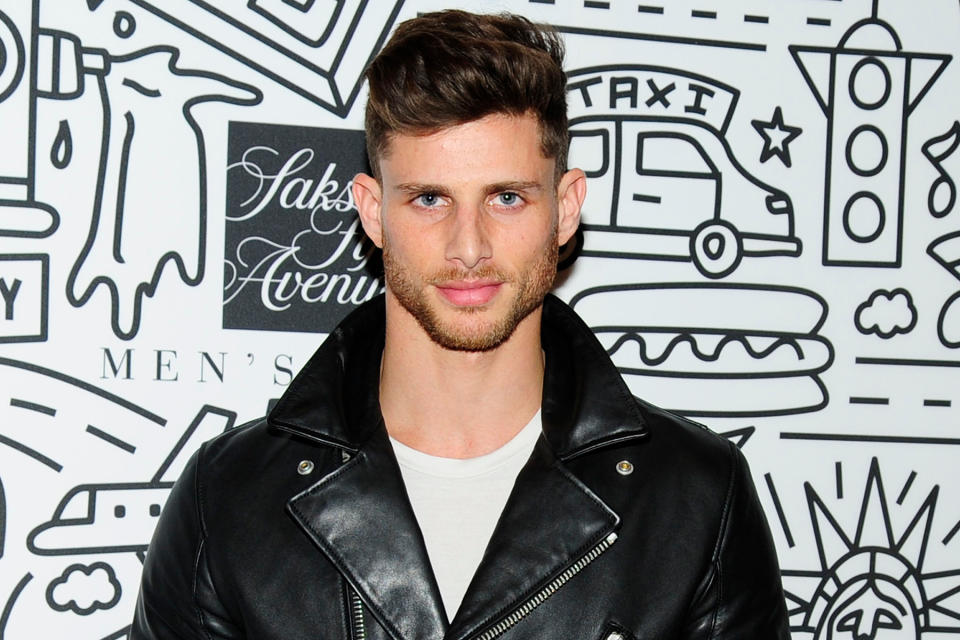
The male model was, at the time, a 19-year-old virgin. For years afterward, he stayed silent. Then, as the #MeToo movement gained momentum, Pall confided in one of his then-agents at Q Model Management about his sexual assault claim against Day.
Pall says the agent’s response was chilling: “‘We can’t tell you what you can and can’t do, but this will probably affect your career.’”
Rolling Stone reviewed an email exchange between Day and Pall dated February 7, 2018, after Pall spoke out on YouTube in January of that year about the difficulties of being a gay man in the modeling industry.
In the email exchange, Day wrote, “I want you to know. I feel awful. I am so sorry. It will bother me all my life that this is how you feel.” Pall replied, “If you are as sorry as you claim to be then you at least owe me the decency to explain yourself to me. Explain why you thought it was appropriate to come to me at the end of that photoshoot when I was 19 and jerk me off. It was supposed to be a professional environment. I wasn’t giving you any advances, and I was a kid.” Day then asked Pall to meet him for coffee. Pall did not respond.
“I don’t think you fully heal with these kinds of things. I was 19, and I didn’t tell anyone just because it was extremely embarrassing. I was extremely ashamed. I wasn’t a queer advocate at the time,” Pall says. “I wasn’t even out in any capacity at that point. That was the first time anything with a man had ever happened to me.”
Pall was one of two male models to share their sexual-assault claims against Day with The Advocate in July 2018. And yet, Day has continued to work as a photographer in magazines like DNA, L’Officiel Italia, and Eclair Magazine. Day also has an erotic OnlyFans account that says it gives subscribers “a daily dose of uncensored images and videos,” with some of the X-rated content captioned as “hung ripped boy” and “skinny boys always got the big cocks.” His Twitter and Instagram pages are request-only protected accounts.
Day did not respond to multiple comment requests.
“I had this big conversation with myself. I’m about to explode my own career. I know this is not going to be something that makes me easy to book. I knew I had to have a shift in my career,” adds Pall.
Pall says that once his story became public, “The person who represented me at the time of my assault came up to me at a club once and apologized and never said specifically what they were sorry for.”
Before coming forward, Pall chose to exit the modeling industry in 2019 and began to build his social media presence to become an influencer. He’s now prominent on TikTok.
“I chose to leave the modeling industry because my boundaries were rarely, if ever, respected. I did not feel like my body was my own, and I realized that to make it in this industry I would have had to sell my soul and my safety, and both of those things are priceless,” Pall says. “No dream is worth your safety. After everything I went through in the industry, I came to the deep realization that my dream was to no longer be a model, but to be a true role model.”
In February 2020, Guess? model Amanda Rodriguez was invited by the fashion brand’s CEO Paul Marciano for a “meeting” in West Hollywood to discuss her work with the company. When she arrived at the meeting, Rodriguez was surprised to find the location was an empty, unfurnished apartment with only a bed in it, a room referred to in her legal complaint as “the rape room.”
Per her complaint filed in Los Angeles, in which she was initially referred to as “Jane Doe” due to concerns of potential retaliation from Marciano, she entered the “rape room” and Marciano began forcibly kissing her and exposed her breasts. “[He] squeezed them so hard that it hurt, and then put his mouth on her breasts.”
“I don’t want this,” Rodriguez says she told Marciano, as cited in the complaint. The fashion executive allegedly attempted to take off her pants, but she refused. Marciano then allegedly exposed his penis to her. The model was “shocked” and “feared what he might do to her, both physically and professionally, if she outright refused him,” so she says she performed oral sex on him under distress.
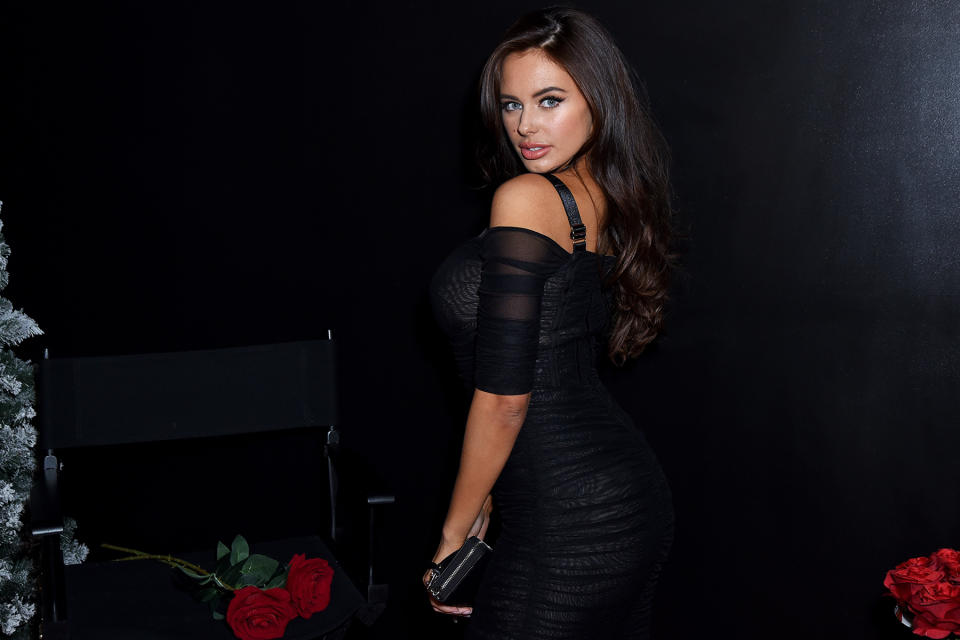
Rodriguez went from being a successful Guess? model to quickly out of work after she came forward against Marciano, alleging he sexually assaulted her. Rodriguez believes that her career has suffered since speaking out.
“Coming out about what happened to me was a huge detriment to my career. My two agents at the time asked me what was going on with me because they could tell that something was off. I was scared to come forward to them but they continued to pry. They insisted they wanted to be in the know, and made me feel like it was a safe space to confide in them,” she shares.
However, Rodriguez says it was not a “safe space” and she was released from her contract shortly thereafter.
“They let me go under the guise of what they claimed were ‘unresolved issues with client relationships,’” she says, adding, “It felt like such a heartless backstab. I was blindsided. It was just more salt in the wound. I felt like I was being punished.”
Jules Newmark, President of newMark Models, says of Rodriguez’s contract release claims, “We do not comment about models (past or present) or about vendors.”
Rodriguez filed a lawsuit against Marciano and Guess, INC. in 2021 that has since been settled. Marciano remains the CEO despite numerous allegations of sexual misconduct, ranging from sexual harassment to rape, from several women. Supermodel Kate Upton claimed the scandal-embroiled mogul allegedly groped and harassed her when she was 18.
Eric W. Rose, Marciano’s spokesperson, tells Rolling Stone of the numerous allegations of sexual misconduct, “Mr. Marciano categorically denies these claims, which were raised years ago and resolved.”
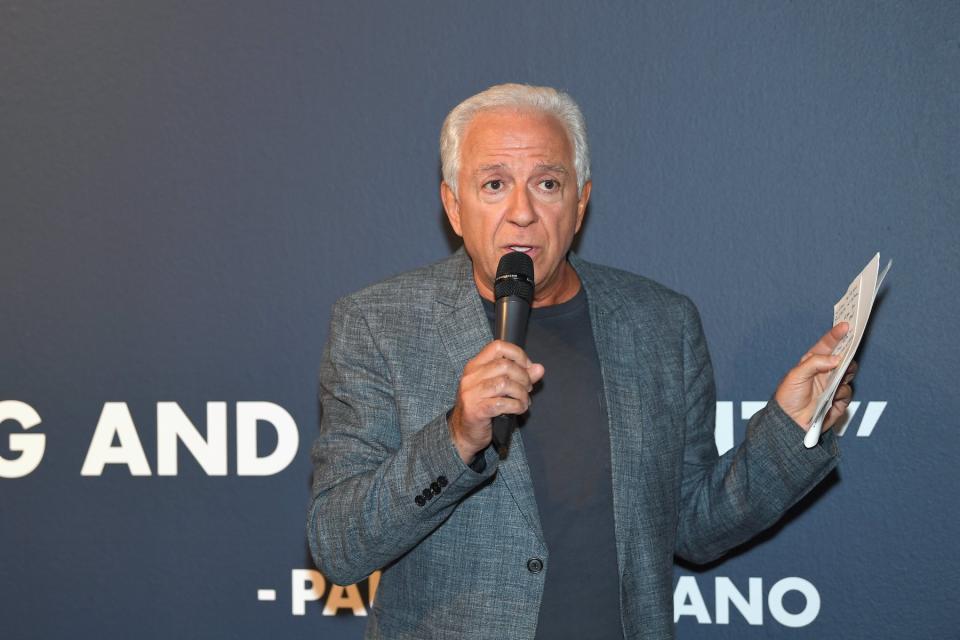
Meanwhile, Rodriguez has found it difficult to regain her footing in the industry.
“Since I spoke out, I now struggle to book jobs unlike ever before. I was booking work regularly and frequently before I came forward about what happened to me. Now, I have definitely experienced what feels like discrimination from some local agencies because of what happened to me. But I’m very thankful for my current agencies.”
Rodriguez adds, “This is why I was so afraid to come forward and speak out. Because we [the models] are doubted, shamed, silenced, picked apart and judged once we finally do step forward. In a way it’s almost easier to shut up and live in denial. We could potentially lose our livelihood if we speak out, and some brands won’t want to work with us anymore.”
After meeting Harvey Weinstein at a New York City event in March 2015, Ambra Battilana Gutierrez was requested for a meeting with the then-Hollywood powerhouse producer at his office. Gutierrez, who was 22 at the time, met him at Weinstein’s Tribeca office. The movie and Project Runway producer reviewed her modeling portfolio, questioning if her breasts were real, and proceeded to grope her breasts. He also, she says, attempted to put his hand under her skirt. She fought off Weinstein and alerted the New York Police Department’s Special Victims Division. When Weinstein called her for another meeting, the NYPD and Gutierrez devised a plan for the model to wear a wire in order to record him.
According to a report in The New Yorker, Weinstein admits on the tape that he touched her breasts: “Oh, please. I’m sorry, just come on in. I’m used to that. Come on. Please.” She then responds, “You’re used to that? Weinstein answers, “Yes. I won’t do it again”
Gutierrez tells Rolling Stone that her career was sidelined following her sexual-misconduct allegations against the now-twice-convicted movie mogul.
“What happened to me at first, I kept thinking that what I did was right but I couldn’t accept that I lost all of my dreams, and I kept seeing people going on with their life and being successful through compromises. It gave me a lot of problems doing what was right, trying to get [Weinstein] to justice,” says Gutierrez. “I couldn’t work for a while, let’s say years. I was at the lowest point of my life. I used to work a lot. I decided when I was about 22 years old, at the start of my career, I went public about saying that somebody did something wrong, and from that moment for about three years I didn’t work.”
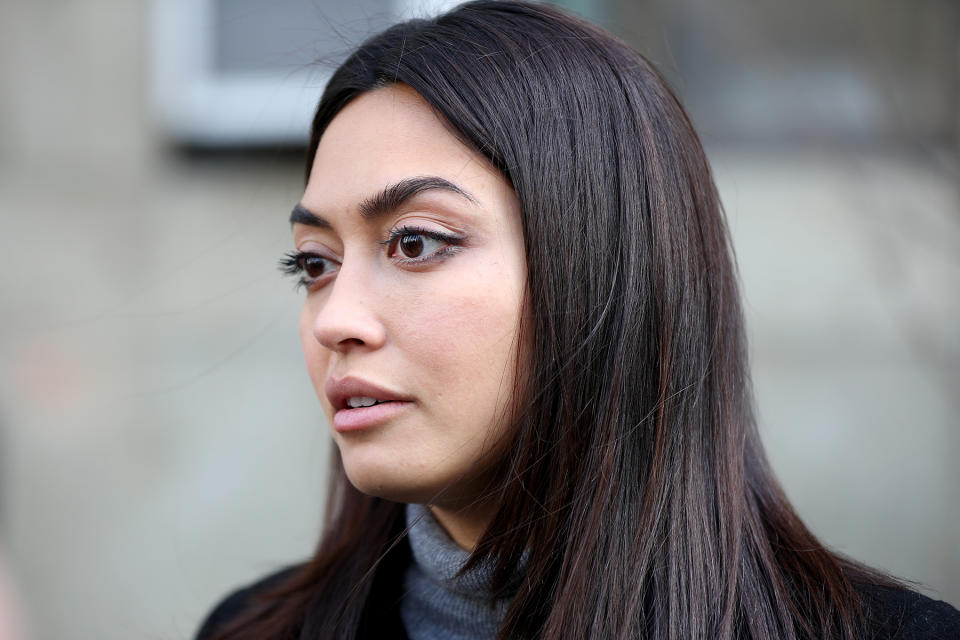
The 30-year-old says that, “A lot of people told me not to speak up. They said it was really crazy to try to go against somebody like him, and they told me it would hurt my career. When I spoke out, all the media that was basically helping him attacked me. They said I was a ‘prostitute.’ They showed my whole bikini photos, my whole lingerie photos all over the news attacking me like I was a prostitute.”
She says that in 2023 “models still face blacklisting” if they make sexual harassment or assault claims.
“There is still fear for models to speak. It’s so easy to replace you. A lot of people that, even now, don’t work with me have something to hide. There’s a lot of magazines and clients that speak a lot about supporting women but knowing whatever I am doing trying to advocate for women’s rights, [they say] maybe I’m not a great fit for their brand. They should not just talk about supporting whatever is right, they should hire these people,” reasons Gutierrez.
Sara Ziff, a former model and the founder and executive director of the Model Alliance, a nonprofit organization that advocates for research and policy-change practices for those in the fashion industry, tells Rolling Stone that since 2012, when she formed the organization, they have run a support line where they hear “time and time again” from models who have experienced sexual abuse and other issues.
“Oftentimes, the people who they are supposed to report to are part of the problem. They’re enabling the abuse. We’ve heard from people who did report to their agents and their response was basically, ‘Oh, he’s doing that again,’ or sort of a blasé response,” says Ziff. “There isn’t any formal channel, certainly not a safe formal channel, to report work-related concerns. Then there’s also the fact that if you look at how the industry is structured, the agencies are more inclined to maintain their relationships with the company or with powerful photographers than the talent that they represent. The talent is essentially encouraged to stay quiet and not rock the boat.”
Ziff and the Model Alliance helped pass the Child Model Act in 2013, setting forth provisions that minors have protections in place. For instance, if a model is 16 or younger, a parent or guardian would have to be present during the photoshoot. The non-profit was also one of the first organizations to lobby for New York’s Adult Survivors Act, a law that provides “a one-year lookback window for survivors of sexual assault that occurred when they were over the age of 18 to sue their abusers regardless of when the abuse occurred.”
“There’s greater awareness for these issues, but very little meaningful reform,” reasons Ziff. “There’s this dichotomy between the industry painting itself as progressive around diversity and inclusion and body positivity, giving people the sense that there’s meaningful progress being made, and then behind-the-scenes the labor structure basically being the same as it was in the Nineties. It hasn’t really changed. It’s sort of camouflaged with progressive values.”
Sutton, meanwhile, says she has spoken to numerous models who’ve told her of their devastating experiences that are strikingly similar to hers.
“It has taken me having a different perspective and speaking to a lot of other different survivors who may not even identify themselves as survivors, because these are the things that happened. They happen to most of us. I still work with PTSD,” Sutton tells Rolling Stone. “I have suffered throughout my entire adult life really believing that adults were going to hurt me, not protect me, were untrustworthy, and this went for sure for men within the industry, but also for a lot of women that I met that were enablers and were complicit to the crimes that took place in my life.”
Best of Rolling Stone

